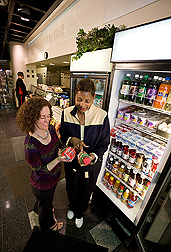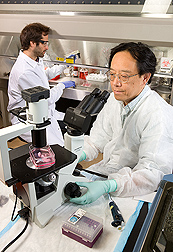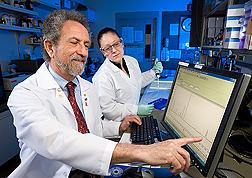Eat Well, But Don’t Feed a Cancer Cell
Scientists do not know exactly why one person develops cancer and another does not. But Agricultural Research Service chemist Thomas Wang, who specializes in cancer prevention research, says that there are “layers” of factors involved in the development of the disease. Wang works at the ARS Diet, Genomics, and Immunology Laboratory, which is part of the Beltsville (Maryland) Human Nutrition Research Center.
Research shows that certain external risk factors increase the chance that a person will develop cancer. These include the molecules that are introduced into the human body by way of ingestion. “This layer involves peoples’ diet complexity,” says Wang. “Diet is a complex mixture of bioactive compounds that trigger huge amounts of biological activity.”
Another major layer is genetics. “People have their own individual genotypes that are dictated by their ethnicity, gender, and inherited traits,” says Wang. Some of those traits involve susceptibilities to cancer.
While individual nutrients are sometimes touted in the media as being able to reduce the risk of developing certain cancers, in fact, such findings can only be confirmed through large clinical trials. Still, evidence from cell culture, animal models, and population studies suggests that interactions among combinations of certain plant chemicals are involved in slowing or possibly lowering the risk of cancer development.
Phytochemicals in Foods
While research suggests that diet can have a protective effect against some chronic diseases, other research is being conducted to learn what dietary components are linked to causing chronic diseases.
Vegetables, fruits, whole grains, beans, nuts, and seeds contain thousands of bioactive phytochemicals. Other compounds are found in some meats, poultry, and fish. Some of these compounds turn on genes that are protective against cancer and turn off other genes linked to cancer promotion.
“Gauging the benefits of consuming these dietary compounds involves careful tracking of concentration, timing, and interactions with other compounds,” says Wang.
Wang published a complementary cell-culture and animal-model study showing that concentrations of resveratrol—a highly bioactive compound found in grapes and other plant foods—actually turned out to be a double-edged sword when it came to mitigating cancer risk.
First, Wang exposed human prostate cancer cells to resveratrol and found that it inhibited the cells’ growth. He further tested the cells’ gene expression. Exposures to male sex hormone are known to increase prostate cancer risk. Wang found that resveratrol actually inhibited male-sex-hormone-mediated pathways.
Wang then tested the effects of resveratrol on a group of laboratory animals that had sex-hormone-dependent tumor cells. Half of those animals were fed a daily diet that included 3 to 6 milligrams of purified resveratrol (equal to roughly the amount in five glasses of wine or grape juice). At first, the tumor cells in the resveratrol-fed lab animals did not grow. But as the resveratrol consumption continued, blood vessels developed around the tumors, effectively setting up a system of feeding the tumors.
“This showed that the concentration of the plant compound is important, but so is length of exposure,” says Wang. The study was published in Carcinogenesis in 2008.
A Balance of Nutrients
The Dietary Guidelines for Americans recommend eating a variety of foods. In addition, some studies have shown that supplementing individual nutrients indiscriminately can disturb the balance of nutrients in the body. “More research needs to be done in this area,” says Wang. “But focusing too much on getting inordinate amounts of a few single nutrients might increase cancer risk.”
Folic acid, for example, is the manmade form of folate, a natural B vitamin found in many vegetables, beans, fruits, and whole grains. Folate is essential for DNA synthesis. Some consumers might start the day getting 200 micrograms (mcg) of folic acid from a fortified breakfast cereal and another 400 mcg from a multivitamin. For them, it would take just one fortified “energy drink” with an additional 400 mcg of folic acid to reach the upper level of 1,000 mcg per day. Any further enriched foods consumed, such as bread, rice, or pasta, would result in the consumer exceeding the amount thought to be well tolerated biologically. The recommended dietary allowance for folate is 400 mcg daily.
“Precancerous and cancerous cells divide rapidly, so they require a lot of building blocks for synthesis of new copies of DNA,” says Joel Mason, director of the ARS-funded Vitamin and Carcinogenesis Laboratory. “It has been shown that under select circumstances, an overabundance of folic acid promotes tumor growth. Studies in laboratory animals substantiate this.” Mason described these concerns in the journal Nutrition Reviews in 2009.
The laboratory is part of the Jean Mayer USDA Human Nutrition Research Center on Aging (HNRCA) at Tufts University in Boston, Massachusetts.
Another Double-Edged Sword
Also in Boston, Jeffrey Blumberg, director of HNRCA’s Antioxidants Research Laboratory, tackled the question of whether supplemental antioxidants, including vitamins C and E and beta-carotene, while protecting healthy cells, may also protect tumor cells during chemotherapy or radiation therapy. He and colleagues reviewed published data from randomized clinical trials addressing benefits versus risks of such antioxidant supplement use.
The researchers concluded that the use of supplemental antioxidants during cancer therapies should be discouraged because of the possibility of tumor protection. The commentary was published in the Journal of the National Cancer Institute in 2008.
Phytochemicals and other food components affect genes that trigger specific molecular mechanisms. Depending on the concentration and exposure over time, some of these mechanisms are similar to detoxification and some promote stress. For example, the food compounds that “turn on” detoxifying phase I and phase II enzymes can help clear the carcinogens.
Consuming a varied diet that provides adequate levels of all recommended nutrients from foods is the best way to eat well without upsetting the balance of individual nutrients in the body. A personalized eating plan and assessment of individual food choices based on the Dietary Guidelines for Americans can be found at MyPyramid.gov.—By Rosalie Marion Bliss, Agricultural Research Service Information Staff.
This research is part of Human Nutrition, an ARS national program (#107) described at www.nps.ars.usda.gov.
To reach scientists mentioned in this article, contact Rosalie Bliss, USDA-ARS Information Staff, 5601 Sunnyside Ave., Beltsville, MD 20705-5129; (301) 504-4318.
"Eat Well, But Don’t Feed a Cancer Cell" was published in the July 2010 issue of Agricultural Research magazine.









